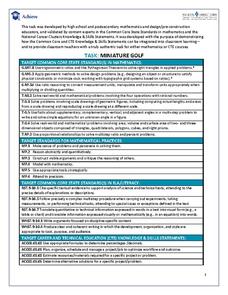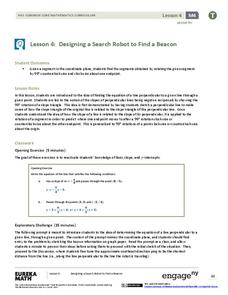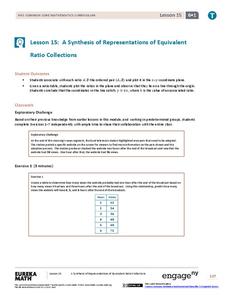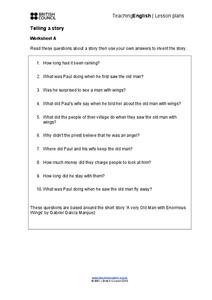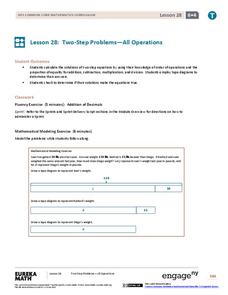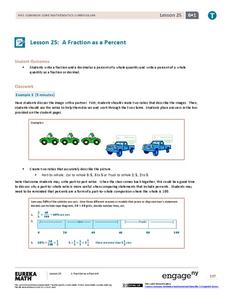EngageNY
Comparing Ratios Using Ratio Tables
Decide which concentration of mixtures is the strongest. Pupils use tables to compare ratios involved in mixtures. They use two methods to make the comparisons — by finding equivalent values within the tables or by comparing the...
Curated OER
Task: Miniature Golf
"Fore!" All right, no one really yells this out in miniature golf, but this well-defined activity will have your charges using lots of numbers in their unique design of a miniature golf hole. Included in the activity criteria is the...
Utah Education Network (UEN)
Real World Equations and Inequalities
Use of the resource = Opportunities for increased learning. Learners must use equations and inequalities to solve real-world and geometric problems.
Code.org
Functions and Top-Down Design
Let me break it down for you! Introduce your class to a way of breaking up a complicated task into its component pieces. Individuals draw a complex figure using JavaScript and then break it down to help determine the...
K12 Reader
Working with Adverbs
Encourage critical thinking with a grammar exercise that focuses on adverbs and adverbial phrases. Kids read the first parts of 16 sentences, then decide which question to answer (how, how much, where, or when) based on the context, and...
TryEngineering
Program Your Own Game
Young computer scientists get to see what it's like to be a software engineer as they use free online software to design a computer game. They play and evaluate games groups created to round out the activity.
Curated OER
Literary Elements and Vocabulary: Mini Quiz
Readers match five literary terms -- personification, narrator, tone, dialogue, foreshadowing -- with their definitions. They also spell, identify the part of speech, define, and write a creative sentence for each of five...
EngageNY
Mid-Module Assessment Task: Grade 7 Mathematics Module 3
Lesson 16 in the series of 28 is a mid-module assessment. Learners simplify expressions, write and solve equations, and write and solve inequalities. Most questions begin as word problems adding a critical thinking component to the...
EngageNY
End-of-Module Assessment Task: Grade 8 Module 1
It's all in the numbers. Determine your pupils' level of understanding of scientific notation using this assessment task. The final lesson in the series assesses scholars on the application of scientific notation in real-life...
EngageNY
Designing a Search Robot to Find a Beacon
Build right angles using coordinate geometry! Pupils explore the concept of slope related to perpendicular lines by examining 90-degree rotations of right triangles. Learners determine the slope of the hypotenuse becomes the opposite...
EngageNY
Population Problems
Find the percent of the population that meets the criteria. The 17th segment of a 20-part unit presents problems that involve percents of a population. Pupils use tape diagrams to create equations to find the percents of subgroups...
EngageNY
Mixture Problems
What percent of the mixture is juice? Pairs use their knowledge of proportions to determine what percent a mixture is juice given the percent of juice in the components. Pupils use the procedure learned with the juice mixture problem to...
EngageNY
An Application of Linear Equations
Just how far will the Facebook post go? Lead a discussion on how to manipulate the sum of a geometric series to figure out a formula to find the sum at any step. The plan contains an alternative to the discussion with more...
EngageNY
A Synthesis of Representations of Equivalent Ratio Collections
Make all the ratio representations fit together. The 15th segment in a series of 29 presents ratio problems to solve. Scholars use a variety of representations to respond to the questions. The problem set has pupils show how the...
Curated OER
Trite Expressions Worksheet 1
For this grammar worksheet, students read twenty sentences to find the trite expression in each one and then think of a creative way to rephrase it.
Curated OER
Geometry Project
Proofs are usually an intimidating assignment. An engaging lesson focused on geometric proofs may reduce the anxiety! Pupils choose between several triangle proofs to complete and work on completing them. The...
K12 Reader
Add a Prepositional Phrase to an Adjective Phrase
Don't just rely on adjectives to describe the nouns in your sentence! Use a handy worksheet to review prepositional and adjective phrases. Learners read eight sentences and add prepositional phrases as adjectives after either the subject...
Curated OER
What's an Ecotect?
In this future jobs activity, students use their creative thinking to select 10 job titles from a list and write a description for each job title. Students discuss as a class what good descriptions are and they discuss life in the future.
Curated OER
Telling A Story
In this ESL storytelling worksheet, students read ten questions about a story and invent their own answers. Students write the story and then complete 2 pages of questions about what they have written.
Meadows Center for Preventing Educational Risk, University of Texas at Austin
Sight Word Fluency Lists 61 to 70
Every word matters. Increase reading fluency with word recognition practice. Scholars continue to practice reading words in each list until they demonstrate mastery. Readers practice both new and review word lists.
EngageNY
Two-Step Problems—All Operations
Step 1: Use the resource. Step 2: Watch your class become experts in solving two-step problems. Scholars learn to solve two-step word problems in context. They use tape diagrams and algebraic techniques to break the problem into two,...
EngageNY
A Fraction as a Percent
It is all about being equivalent. Class members convert between fractions, decimals, and percents. By using visual models, scholars verify their conversions in the 25th portion of a 29-part series.
EngageNY
Modeling a Context from Data (part 2)
Forgive me, I regress. Building upon previous modeling activities, the class examines models using the regression function on a graphing calculator. They use the modeling process to interpret the context and to make predictions...
EngageNY
Solving Area Problems Using Scale Drawings
Calculate the areas of scale drawings until a more efficient method emerges. Pupils find the relationship between the scale factor of a scale drawing and the scale of the areas. They determine the scale of the areas is the square of the...

